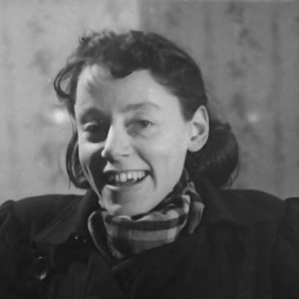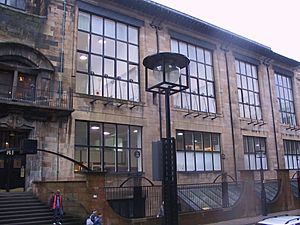Helen Biggar facts for kids
Quick facts for kids
Helen Manson Biggar
|
|
|---|---|

Helen Biggar died 1953
|
|
| Born | 25 May 1909 Glasgow, Scotland
|
| Died | 28 March 1953 (aged 43) St Mary Abbots Hospital, London, England
|
| Nationality | Scottish |
| Other names | Helen Montlake (married name) |
| Alma mater | Glasgow School of Art |
| Occupation | sculptor, theatre designer, political activist, film maker |
| Spouse(s) | Eli Montlake (1948 – her death) |
Helen Biggar (born May 25, 1909 – died March 28, 1953) was a talented Scottish artist. She was a sculptor, filmmaker, and theatre designer. During the 1930s, she was very involved in politics. She joined the Communist Party of Great Britain and helped create a powerful film called Hell Unltd. This film is known as an important early political movie in Britain.
Contents
Helen Biggar's Early Life and Learning
Helen Biggar was born in Glasgow, Scotland, in 1909. She was the oldest daughter of Florence and Hugh Biggar. Her father was a founder of the Independent Labour Party, a political group. Her uncle, John McLaren Biggar, was the Lord Provost of Glasgow from 1941 to 1943.
As a child, Helen had several accidents. Two injuries to her spine affected her height.
In 1925, at age 16, Helen started studying at the Glasgow School of Art. She first studied textile design and graduated in 1929. After that, she continued her studies in sculpture at a higher level. Once she finished her education, she opened her own art studio in Glasgow.
In 1945, Helen moved to London. She married Eli Montlake in 1948. She passed away at St Mary Abbots Hospital in London after a sudden illness.
Helen Biggar's Artistic Work
Sculpture Creations
Helen Biggar created sculptures using different materials. These included plaster, clay, and stone. She often focused on making portraits of people. One person she sculpted was Emilio Coia, who was a fellow student at art school.
She also sculpted her sister Mary and her uncle John Biggar. The sculpture of her uncle was shown in 1935 at the Royal Glasgow Institute of the Fine Arts.
Film Projects
After leaving the Glasgow School of Art, Helen met Norman McLaren. They shared similar political ideas. In 1935, they worked together on an animated film called Camera Makes Whoopee.
They teamed up again in 1936 for Hell Unltd. This film was a protest against government spending on weapons. It argued that money should be spent on healthcare and welfare instead. The film used a mix of animation, old film clips, and live-action scenes. Hell Unltd was bought and shared by Kino Films. Helen and Norman worked very closely on this film, sharing many ideas.
In March 1938, Helen made a documentary about Glasgow's May Day Procession. It was called May Day 1938 or Challenge to Fascism. She used three 16mm cameras for the film. Her old art tutor, Willie Maclean, and G. Bartlett helped her film. Helen even placed an advertisement to ask for help raising money for the film.
Theatre Design
In 1938, Helen Biggar joined the Glasgow Workers' Theatre Group. She became their stage designer, creating the look of the plays.
Later, in 1940, she designed for the Glasgow Unity Theatre. In 1950, she joined Ballet Rambert. There, she worked as a costume designer and managed the wardrobe for the ballet company.
Helen Biggar's Legacy
Helen Biggar's niece, Anna Shepherd, wrote two books about her life. The first book, Traces Left, was not published. However, it was used for a documentary film in 1983. In 2014, Anna Shepherd published another book called Helen Unlimited: A Little Biggar.
In November 2022, Helen Biggar's work was shown in an exhibition called GLEAN. This exhibition was at Edinburgh's City Art Centre. It featured 14 early women photographers who worked in Scotland. The photographs and films were chosen by Jenny Brownrigg.
The artists included Helen Biggar, Violet Banks, Christina Broom, M.E.M. Donaldson, Dr Beatrice Garvie, Jenny Gilbertson, Isabel Frances Grant, Ruby Grierson, Marion Grierson, Isobel Wylie Hutchison, Johanna Kissling, Isabell Burton-MacKenzie, Margaret Fay Shaw, and Margaret Watkins.
 | Bayard Rustin |
 | Jeannette Carter |
 | Jeremiah A. Brown |


